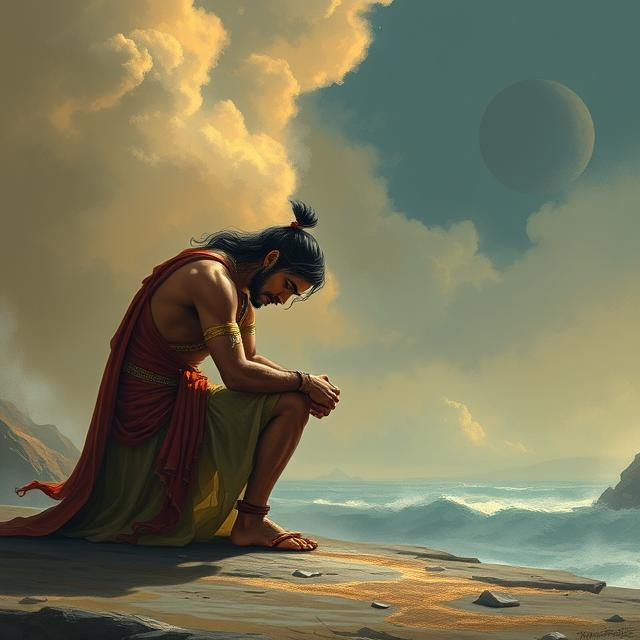Empower(mo)ment
Arjuna knelt alone, broken.
This mighty warrior, the single-handed conqueror of foes, now sobbed uncontrollably. His dearest friend and divine confidant, Sri Krishna, had left him, leaving him with one final duty: to escort Krishna’s queens safely to Hastinapur as Dwarka crumbled into the sea.
Once a jewel of divine splendour, Dwarka now stood abandoned, marked for destruction. Where opulence and sanctity had reigned, only the hollow echo of impending devastation remained. The waves of time and divine separation were poised to submerge the glorious capital that had once sparkled with celestial riches.
As the ocean began its submergence, Arjuna led his entourage away from the doomed city. They had barely begun their journey when fate struck cruelly—a band of simple cowherds, covetously drunk and armed just with sticks, descended upon them.
“Fools!” Arjuna thundered. “I am Arjuna, whose arrows have felled armies! Retreat now or meet your end!”
But the thieves, blinded by base desire, charged ahead. Arjuna reached for his Gandiva, the celestial bow that had never failed him—yet something was wrong. The bow felt foreign in his grasp. His fingers fumbled as he struggled to string it.
When he finally grasped a hold, Arjuna called forth the mantras that would imbue his arrows with divine power. His mind went blank. The sacred words had vanished like morning mist.
In desperation, he fired simple arrows that once split the air with precision but now wobbled pathetically, barely piercing the skin of his enemies. The elite Narayani Sena warriors fell one by one to crude clubs. The raiders seized Krishna’s queens before Arjuna’s horrified eyes.
This was the ultimate humiliation. The greatest archer the world had ever known returned to Hastinapur empty-handed, defeated by nameless thieves armed with sticks.
Why would Krishna allow this? The answer lies in divine arrangement:
Long ago, celestial maidens had pleased the sage Aṣṭāvakra with their service but laughed at his twisted gait. Angered, he cursed them to be kidnapped by rogues even if they married the Supreme Lord. When they begged forgiveness, he modified his curse: though kidnapped, they would eventually reunite with their divine husband.
Krishna orchestrated Arjuna’s apparent failure not as punishment but as fulfilment—both of the sage’s prophecy and His promise to recall His devoted souls to the eternal realm. The rogues? None other than the Lord and His expansions, personally reuniting Himself with His eternal beloveds, veiled from mortal eyes in a divine play of separation and reunion.
From this divine drama, three lessons emerge:
First, in the realm of genuine devotion, failure doesn’t exist. Arjuna’s apparent defeat fulfilled Krishna’s perfect plan. What seemed like humiliation was, in truth, participation in divine arrangement—sincerity of purpose becoming success even as arrows failed.
Second, all power is but borrowed light. Bhaktivedanta wisely cautions that no one should be puffed up with borrowed plumes. Arjuna’s celestial abilities were withdrawn after Krishna’s departure for two reasons: the divine mission was complete, and such powers held no value for his journey back to the spiritual kingdom. The Gandiva that conquered armies now lay silent, reminding us that our talents are temporary gifts, flowing through us but never belonging to us.
Third, bhakti is an exhilarating adventure of empowerment beyond our inherent capabilities. Throughout his life, Arjuna accomplished the impossible through acting as an instrument of divine grace. True adventure only begins with complete surrender to divine will, without acquiescence. We need not marvel at whom the Lord chooses to empower; rather, we seek inspiration when souls rise to accept such divine empowerment, becoming instruments in divine play.
As Arjuna’s bow lay unstrung and his quiver empty, a greater journey was beginning. In that moment where borrowed powers dissolved and human prowess failed, the real adventure of devotion dawned. This is the heart of spiritual life: our greatest strength emerges when we abandon personal power and ambition. With empty hands raised in surrender, whispering “Your will, not mine,” we step into the true adventure—the eternal journey of the soul returning to dance with his Lord.

